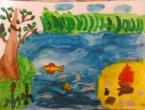“The rule for using the prepositions about and about. In what cases is a word used with a preposition? Prepositions about about the rule
Why are you right when you are unhappy after hearing or reading someone’s “I’m back from the store”, “I can’t say anything about this film, I haven’t seen it”? We analyze difficult cases of using simple prepositions, taking into account the advice of the Gramota.ru portal.
To a doctor or to a doctor?
Despite the two consonants in a row in the word “doctor,” it is correct to write and say “to the doctor.” “to” is required only in a number of cases:
– before the words “lion”, “ice”, “flax”, “forehead”, “lie”, “moss”, “ditch”, “rye”, “mouth”, “whole”, “every”, “every” , “Tuesday”, “second”, “many” in the dative case: to the forehead, to the lion, to every holiday;
– before the word “me”: come to me;
– before the words “yesterday”, “seam” you can use both the preposition “to” and the preposition “to”: let’s turn to/to yesterday’s news.
BUT! In some cases (in fiction, in journalism), to add pathos and solemnity to the speech, it is possible to replace the preposition “to” with “to”: to the universal tragedy.
ABOUT the book or ABOUT the book?
Both options are possible, but the preposition “about” is a sign of a conversational style, casual speech, while the phrase with “about” is stylistically neutral and impeccably correct.
In Ukraine or IN Ukraine?
This is one of the most popular questions for specialists of the Gramota.ru portal. Their answer: the literary norm of the modern Russian language is “in Ukraine”, “from Ukraine”. And no politics, only traditions of the great and mighty, which have developed over centuries.
Control FOR or control OVER?
Both prepositions can be used in pairs with nouns that are formed from verbs: control over / over the expenditure of profit. Subtleties: if a noun denotes an action, process or characteristic, it is better to choose the preposition “for” (monitoring the independent work of students, monitoring the execution of the director’s order). And if this is an abstract concept or an animate object, the scales tip in favor of “over” (control over interns, control over the business).
Worry FOR or worry ABOUT?
There is no need to worry about your own literacy or think badly about it: both options have a right to exist. Previously, however, the construction “to worry about something or someone” was considered colloquial.
About everyone, ABOUT everyone or ABOUT everyone?
Correct answer: about everyone. When are the prepositions “about”, “about” and about” needed?
– in the accusative case, before words that begin with consonants (except for the words “everything”, “all”, “all”, “everyone”, “what”), we write and pronounce the prepositions “o” / “about”: hit about / about water;
– in the accusative case, before words that begin with vowels, the preposition “about” is needed: about the university, about apricot jam;
– in the accusative case, before the words “all”, “all”, “everyone”, “all”, “what”, “anything”, “anything”, “something” we put the preposition “about”: stuttered about something in the dark;
– in the prepositional case, before words that begin with consonants (except for the words “me”, “everyone”, “everyone”, “everyone”), the preposition “o” is required: sang about love;
– in the prepositional case, before words that begin with vowels, the preposition “about” is used: reminded me about the vacation;
– in the prepositional case, before the words “me”, “everyone”, “all”, “all”, the preposition “about” is needed: I guessed about all her tricks.
BUT! For words with “e”, “e”, “yu”, “ya” at the beginning (the case is no longer important) only the preposition “o” is suitable, since they “start” with the consonant sound “th” not in writing, but in pronunciation ": Christmas tree = yolka, so about the Christmas tree, about apples, about the lawyer.

FOR the book or ABOUT the book?
Which phrase seems more euphonious to you: “I’ll say about the new book: interesting” or “I’ll say about the new book: interesting”? You are right: using the preposition “for” instead of the preposition “about” is incorrect.
Is he from the store or is he from the store?
Let’s remember pairs of prepositions that complement each other like yin and yang: the preposition “of” is a partner of “in”, and the preposition “with” is a friend of “on”. That is, if someone goes to the store, they will return from the store, and not from it. And if someone is from the Urals, then they will go to the Urals to visit their parents (compare: “I’m from Siberia,” but “I’m going to Siberia”).
Since yesterday or SINCE yesterday?
In this example, both options are equal. In general, the preposition “with” instead of “with” is necessary:
- before words that begin with “s/z/sh/zh + consonant” or with the consonant “sch”: from a schooner, with generosity;
– before the words “lion”, “ice”, “flax”, “forehead”, “moss”, “ditch”, “mouth” in the genitive and instrumental cases: from the forehead, with ice;
– with the words “me”, “me”;
– before the case forms of the words “louse”, “whole”, “everyone”, “every one”, “Tuesday”, “second”, “many”: from Tuesday, with everyone;
- in stable combinations: with taste, with attention, with time, from the yard, from day to day, from the bottom.
BETWEEN the trees or BETWEEN the trees?
Philologists know: to say “between what?” and “between what?” not a mistake. But the second option (between trees, between tables, between books) is considered obsolete.
At our own place or At our own place?
There is no need to repeat the preposition in such expressions; this is a feature of common speech.
In the Universe or IN the Universe?
Before words that begin with “v/f + consonant” (in the All-Russian competition, the need for fluoridation of water), you need to write and pronounce the preposition “in”. Otherwise, especially in oral speech, it is easy to stumble over an unpronounceable cluster of consonant sounds.
BY May 20 or BEFORE May 20?
So, you need to designate a time period for yourself or someone else and indicate its end date. It is generally accepted that in a date with the preposition “before” the previous day serves as the boundary: for example, until May 20 is May 19 as the deadline. And if it says “until May 20,” then you can complete the task on the 20th. But linguists emphasize: constructions with both prepositions do not reliably determine whether the reference date is included in the period it ends. And they advise adding the adverb “inclusive”: from May 10 to May 20 inclusive, from May 10 to May 20 inclusive.
By Monday or On Monday?
And again the subtleties of meaning. “By Monday” means something needs to be done on Sunday, before the next day starts. “On Monday” means that the work can be done during this day.
Statement by Petrova or statement FROM Petrova?
Both options when writing a document are equivalent: to use a preposition or not - the choice is yours.

To the question Spelling O and OB asked by the author Vadim Bogdanov the best answer is that in the Russian language there is the following rule: before nouns in the prepositional case, the prepositions “o” or “about” are used. "O" is used when the word behind it begins with a consonant sound, for example: talking about the weather. “About” is used if it is followed by a word that begins with a vowel sound, for example: an article about nuts. You need to pay close attention to the fact that the choice of whether “o” or “ob” is correct depends not on the letter, but on the first sound. In the Russian language there are vowel letters that begin with the consonant sound “y”, these are yu, ya, e, ё. Therefore, if the word next to the preposition being studied begins with one of these letters, then we will choose the preposition “o”. Example: this story is about a hedgehog.
Answer from Spica[newbie]
As for the variants O and OB, we were taught that if the subsequent word begins with A, O, I, U, E, then we use OB. In other cases (before E, Yo, Yu, Ya, as well as before consonants) - O. Examples are: about ethics, but about zhevik (blackberry); about the alphabet, but about hay (ash); about shoes,
Answer from Astronaut[active]
Answer from Instrumentation[newbie]
in the Russian language there is the following rule: before nouns in the prepositional case, the prepositions “o” or “about” are used. "O" is used when the word behind it begins with a consonant sound, for example: talking about the weather. “About” is used if it is followed by a word that begins with a vowel sound, for example: an article about nuts. You need to pay close attention to the fact that the choice of whether “o” or “ob” is correct depends not on the letter, but on the first sound. In the Russian language there are vowel letters that begin with the consonant sound “y”, these are yu, ya, e, ё. Therefore, if the word next to the preposition being studied begins with one of these letters, then we will choose the preposition “o”. Example: this story is about a hedgehog.
Answer from I-beam[newbie]
"O" is used when the word behind it begins with a consonant sound, for example: talking about the weather. “About” is used if the word behind it begins with a vowel sound, for example: an article about nuts. You need to pay close attention to the fact that the choice of which is correct: “o” or “about” depends not on the letter, but on the first sound in the next word. In the Russian language there are vowel letters that begin with the consonant sound “y”, these are yu, ya, e, ё. If the word following the preposition begins with one of these letters, then we will choose the preposition “o”. Example: this story is about a hedgehog.
Information taken from the "Pismovnik" from the portal gramota.ru
For the Day of Knowledge or for the Day of Knowledge?
In the Russian language, a number of prepositions have variants with the final vowel o: without and without, in and in, k and ko, s and so, etc. The addition of the vowel o is observed in a number of cases:
1) before a monosyllabic word starting with several consonants: in a dream (but in dreams); above me (but: above the multitude);
2) if the subsequent word begins with the same consonant that ends the preposition without o: in + power = in power; s + tears = with tears;
3) in a number of stable expressions: a hundred times, with all our might, etc.;
4) when used with a touch of solemnity: In days of doubt, in days of painful thoughts... (but: on school holidays); Angel in the flesh.
Without - without
The preposition without is used before the genitive case forms of the words all, every, along with the preposition without: without any doubts and without any doubts; without all employees and without all employees.
In - in
The preposition is used:
1) before word forms beginning with combinations “v, f + consonant”: in the gaze, in the power, in France (but: in Finland), in Vladimir (but: in Venice), in everything, on Tuesday, in the phrase;
2) before the prepositional case forms of the words lion, ice, flax, forehead, lie, moss, ditch, rye, mouth: in a lie, in a ditch;
3) before the form to me: in me;
4) before the word forms many, many, many, plural: in many cases, in many cases; in plural;
5) before the form what: What has our park become?
The preposition in is used in the meaning “somewhere, somewhere” with the forms of the words yard (in the yard, into the yard), palace (in the palace, into the palace), haze (in the darkness, in the darkness), gloom (in the darkness, in darkness), darkness (in darkness, into darkness), as well as with the forms of words in a dream, in the womb.
The preposition in is used in the meaning “for the sake of something” in combinations for good (to do something), for evil (to use something), in order to avoid (what), in the name of (whom, what), in fulfillment (of what) , for the glory (of someone), for salvation (a lie for salvation). But: in commemoration.
The preposition in is also used in stable combinations: in full (support, spirit, voice, growth); tradesman in the nobility, in opinion (to agree, to disagree), how many (times), as many (times), a hundred times, in the prime of life, brothers (sisters) in Christ, at the head of the corner (but: at the head of the novel), like chickens in cabbage soup.
From - iso
The preposition iso is used:
1) before the genitive case forms of the words lion, ice, flax, forehead, lie, moss, ditch, rye, mouth: linen shirt;
2) in stable combinations, day after day, with all your might.
In combination with the words everything, all, all, both prepositions are used - from and iso: blowing from all the cracks and from all the cracks.
K - co
The preposition ko is used:
1) before the dative case forms of the words lion, ice, flax, forehead, lie, moss, ditch, rye, mouth: to the lion, to the forehead;
2) before the dative case forms of the words all, every, every, Tuesday, second, second, many, much: to do by Tuesday, to every person, by the second number (but with a number: by September 2);
3) in stable combinations with words to the time (in the meaning of “on time, on time”: such reasoning is not in time), (not) to the yard (“inopportunely”: not to come to the yard, but: the car drove up to the yard); to the day (in the sense of being confined to some event, holiday: a gift for a birthday, but: treat a birthday without enthusiasm); essay for Victory Day (but: finish the improvement by City Day); in stable combinations with the words day, sleep: go to the bottom, go to bed (go to bed), tend to sleep (want to sleep).
In combination with the words yesterday, seam, both prepositions are used - to and to: to yesterday's newspapers and to yesterday's newspapers.
Above - must
The preposition must is used before the instrumental case forms of the words lion, ice, flax, forehead, moss, ditch, mouth, as well as before the forms me, me: nad ditch; above me, above me.
Before the forms of the word all, both prepositions are used - above and necessary: above the whole world and above the whole world.
Oh - about - about
The choice of preposition depends on what sound (vowel or consonant) the next word begins with and in what case form it is used:
1) in the accusative case, before words beginning with consonants (except for the forms of pronominal words all, all, all, all, that), the prepositions about and about are used: tripped over the threshold and over the threshold; hit the stone and the stone;
2) in the accusative case, before words beginning with vowels, only the preposition about is used: tripped over a sharp stone;
3) in the accusative case, before the forms of pronominal words all, all, all, all, that, as well as something, anything, something, the preposition about is used: tripped over all the stones; What did you trip over?
4) in the prepositional case, before words beginning with consonants (except for the forms of pronominal words to me, to everything, to all, to all), the preposition about is used: I learned about relatives, I remembered about the bride;
5) in the prepositional case, before words beginning with vowels, the preposition about is used: to remember about the father; think about studying;
6) in the prepositional case, before the forms of pronominal words me, everything, all, everyone, the preposition about is used: I learned about all my relatives, I remembered about me. However, in fiction it is possible: about everything, about everything, about everyone (The girl sang in the church choir // About all the tired in a foreign land... A. Blok).
Note. It is necessary to pay attention that words starting with the letters e, e, yu, i are words starting with the consonant sound [j]. Therefore, it is correct: to discuss Europe, a song about a Christmas tree, remember your youth, talk about Yandex (not about).
From - from
The preposition oto is used:
1) before the genitive case forms of nouns lion, ice, flax, lie, forehead, moss, ditch, rye, mouth: the river was freed from ice;
2) in stable combinations: day by day, wake up from sleep.
Before the forms of everything, all, all, both prepositions are used - from and from: from everyone and from everyone (but: I congratulate you with all my heart...).
Before - in front
The preposition before is used with the forms me, by me: stand in front of me.
With the words lion, ice, flax, forehead, moss, ditch, mouth, both prepositions are used - before and before: before the lion and before the lion.
Under - under
The preposition podo is used:
1) before the instrumental case forms of nouns lion, ice, flax, forehead, moss, ditch, mouth: under the ice;
2) before the accusative case forms of the word that: under what, under something, under something;
3) in front of the forms by me, by me: the Caucasus under me.
With the forms of everything, all, all, all, all, all, all, all, both prepositions are used - under and below: under all the trees and under all the trees.
C - co
The preposition co is used:
1) before words starting with combinations [s, z, w, w + consonant] or with a consonant [sch]: with a hundred, with glory, with a star, with a cabinet, with a tourniquet, with cabbage soup;
2) before the genitive and instrumental case forms of the words lion, ice, flax, forehead, moss, ditch, mouth: fight with a lion, whiskey with ice;
3) with the words me, me;
4) before the word forms louse, all, every, every, Tuesday, second, second, many, much: with everyone you meet, with many people;
The preposition co is used in stable combinations: with taste (to do something); with attention (meaning “attentively”: listen with attention); over time (meaning “in the future”: with time everything will get better); from the yard (to leave); from day to day (meaning “soon”), from day (meaning the starting point of time: two months have passed since the wedding), from the bottom (to get it).
With the shift of emphasis, the preposition co is used in combinations: with the light (to live), with laughter (to die), with a hundred (surrender).
Before forms of the word yesterday, both prepositions can be used - with and with: from yesterday and from yesterday.
List of sources:
1. Orthoepic dictionary of the Russian language: Pronunciation, stress, grammatical forms / S. N. Borunova, V. L. Vorontsova, N. A. Eskova; Ed. R.I. Avanesova. - 8th ed., M., 2000.
2. Eskova N. A. A short dictionary of difficulties of the Russian language. Grammatical forms. Emphasis. - 6th ed., M., 2008.
There are prepositions in Russian V/VO, S/SO, O/OB. Each of these pairs of prepositions has the same meaning with a slight difference, adding the vowel letter “O” for ease of pronouncing the words. Let's look at examples of when it is necessary to use a specific preposition.
Prepositions В or ВО
If a word after a preposition begins with two consonants, the first of which is V or F, then the preposition VO is used in speech and writing:In fr agmente, in fr aze, in France ances, in fr Ansuzian, in fl Akone
There is a very interesting quote in a fragment of this film. – – There is a very interesting quote in the fragment of this film.
At the French restaurant we tried the new summer menu. – – We tasted a new summer menu in the French restaurant.
On Tue orom, on Tue ornik, in HF let's make a fuss, in the air I see in ow adenia, on Sun yak
His car was in the second row on the road. – – His car was in the second row on the road.
I found my interview in yesterday's magazine. – – I found my interview in yesterday’s magazine.
The preposition VO is also used with the following words:
In many wow, in many wow, in in yes, in and me
They took a full-length photo with a smartphone. – – They took photos on the smartphone in all their height.
This book is very popular and is published in many countries around the world. – – This book is very popular and published in many countries of the world.
Prepositions C or CO
The principle of use is the same as in the previous pair of prepositions. The letter O is added to the preposition C if the preposition is used with a word that begins with two consonants.From the chair, with me, with tears, with everyone, with many
Take your toy from the chair! – – Take your toy from the chair.
Who will go to the river with me today? – – Who will come to the river with me?
Prepositions O or OB
In the case of the preposition O, the letter B is added if the preposition comes before a word that begins with the vowels A, I, O, U, E.About these about toys, about Arine, about lesson, about encyclopedias.
I've heard a lot about these people. – – I’ve heard a lot about these people.
Jason called his friends in the UK and told them about Russian language lessons. – – Jason called to his friends in Great Britain and told about his Russian language lessons.
In addition, with some words starting with a consonant, the preposition OBO is used:
About everyone, about to me
I can talk to you about everything in the world! – – It’s possible to talk about everything in the world with you!
Don't ask anything about me! – – Don’t ask anything about me!
Exceptions:
Your new story is about you? – – Is your story about you?




